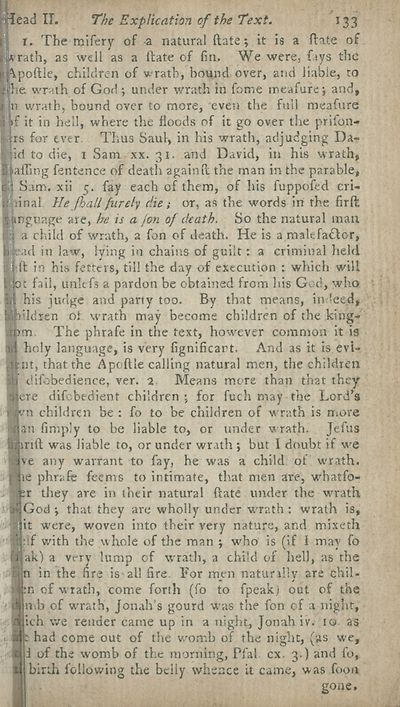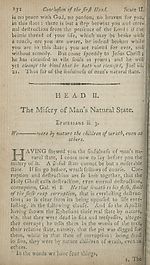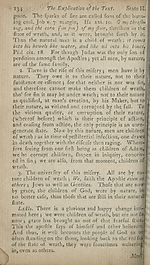Download files
Complete book:
Individual page:
Thumbnail gallery: Grid view | List view

[ead IT. The Explication of the Text. 133
r. The mifery of a natural (late; it is a flate of
Itrath, as well as a ilate of fm. We were, fiys the
ii|Apoftle, children of wrath, bound over, and liable, to
She wrath of God -, under wrath in fotne ineafure; and,
n wrath, bound over to more, even the full meafure
|f it in hell, where the floods of it go over the priibn-
t its for ever Thus Saul, in his wrath, adjudging Da-
lid to die, 1 Sam xx. 31. and David, in his wrath,
laffing fentence of deatli again Pc the man in the parable,
|l| Sam. xii 5. fay each of them, of his fuppofed cri-
ainal He [hall furely die; or, as the words in the firft
unguage are, he is a jon of death. So the natural mail
a child of wrath, a fon of death. He is a maltfaftor,
ad in law, lying in chains of guilt : a criminal held
ft in his fetters, till the day of execution : which will
t fail, unit fs a pardon be obtained from his God, who
his judge and party too. By that means, indeed,
ildren ol wrath may become children of the king-
m The phrafe in the text, however common it is
holy language, is very fignificart. And as it is evi-
nt, that the Apoftle calling natural men, the children
difobedience, ver. 2 Means more than that they
jere drfcbedient children ; for fuch may the Lord’s
n children be : fo to be children of wrath is more
an fimply to be liable to, or under wrath. Jefus
rift was liable to, or under wrath ; but I doubt if we
ve any warrant to fay, he was a child of wrath,
re phrafe feems to intimate, that men are, whatfo-
r they are in their natural ftate under the wrath
God •, that they are wholly under ■wrath : wrath is,
it were, woven into their very nature, and mixeth
l:lf with the whole of the man ; who is (if I may fo
ak) a very lump of wrath, a child of hell, as the
in the fire is-all fire For men naturally are chil-
|:n of wrath, come forth (fo to fpeak) out of the
mb of wrath, Jonah's gourd was the fon cf a night,
itch we render came up in a night, Jonah iv. to as
: had come out of the womb of the night, (as we,
|i of the womb of the morning, Pfal cx. 3.) and fo,
birth following the belly whence it came, was foon
gone.
a
1
r. The mifery of a natural (late; it is a flate of
Itrath, as well as a ilate of fm. We were, fiys the
ii|Apoftle, children of wrath, bound over, and liable, to
She wrath of God -, under wrath in fotne ineafure; and,
n wrath, bound over to more, even the full meafure
|f it in hell, where the floods of it go over the priibn-
t its for ever Thus Saul, in his wrath, adjudging Da-
lid to die, 1 Sam xx. 31. and David, in his wrath,
laffing fentence of deatli again Pc the man in the parable,
|l| Sam. xii 5. fay each of them, of his fuppofed cri-
ainal He [hall furely die; or, as the words in the firft
unguage are, he is a jon of death. So the natural mail
a child of wrath, a fon of death. He is a maltfaftor,
ad in law, lying in chains of guilt : a criminal held
ft in his fetters, till the day of execution : which will
t fail, unit fs a pardon be obtained from his God, who
his judge and party too. By that means, indeed,
ildren ol wrath may become children of the king-
m The phrafe in the text, however common it is
holy language, is very fignificart. And as it is evi-
nt, that the Apoftle calling natural men, the children
difobedience, ver. 2 Means more than that they
jere drfcbedient children ; for fuch may the Lord’s
n children be : fo to be children of wrath is more
an fimply to be liable to, or under wrath. Jefus
rift was liable to, or under wrath ; but I doubt if we
ve any warrant to fay, he was a child of wrath,
re phrafe feems to intimate, that men are, whatfo-
r they are in their natural ftate under the wrath
God •, that they are wholly under ■wrath : wrath is,
it were, woven into their very nature, and mixeth
l:lf with the whole of the man ; who is (if I may fo
ak) a very lump of wrath, a child of hell, as the
in the fire is-all fire For men naturally are chil-
|:n of wrath, come forth (fo to fpeak) out of the
mb of wrath, Jonah's gourd was the fon cf a night,
itch we render came up in a night, Jonah iv. to as
: had come out of the womb of the night, (as we,
|i of the womb of the morning, Pfal cx. 3.) and fo,
birth following the belly whence it came, was foon
gone.
a
1
Set display mode to:
![]() Universal Viewer |
Universal Viewer | ![]() Mirador |
Large image | Transcription
Mirador |
Large image | Transcription
| Antiquarian books of Scotland > Religion & morality > Human nature in its fourfold state > (137) |
|---|
| Permanent URL | https://digital.nls.uk/107542790 |
|---|
| Description | Thousands of printed books from the Antiquarian Books of Scotland collection which dates from 1641 to the 1980s. The collection consists of 14,800 books which were published in Scotland or have a Scottish connection, e.g. through the author, printer or owner. Subjects covered include sport, education, diseases, adventure, occupations, Jacobites, politics and religion. Among the 29 languages represented are English, Gaelic, Italian, French, Russian and Swedish. |
|---|

